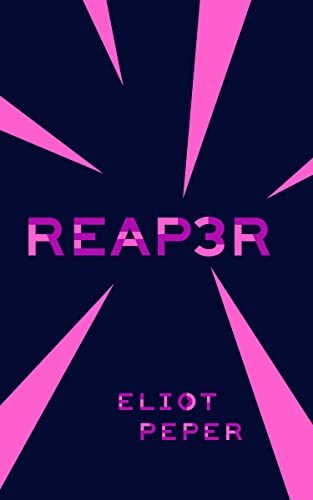“…unlike fiction, reality needn’t be plausible”
Reap3r, chapter 37

I received an advance review copy of Eliot‘s tenth novel in February and, as prior books, began to read it nearly instantly. As I read through the first few chapters, however, I found myself needing to know the characters more. So, I began again, and again, and again. Each read exposed a strength or flaw in the human characters and I chose to slow down my reading pace to get to know them better.
There is no doubt this work is a work of fiction. The quote above reminded me what I was reading may be fiction yet is very likely to be real. In the near future likely to occur within our lifetimes. And that simultaneously makes this story frighteningly believable.
Eliot’s characters often carry a social conscience, and this book is no different. It isn’t hard to distinguish right from wrong, or to empathize with their struggle. The classic struggle of power over community, money over integrity, and self over sentient collectiveness are threaded throughout.
The tale spun deftly through this extremely fast-moving book is composed of numerous complex characters, who revealed themselves to the author in a different intimacy that the reader discovers in layers. I found the memory remembered by one of the characters in the quote below quite apt for the relationship between the characters, Eliot and the reader:
You face one way – towards the source-when you are learning what you want to say, he’d advised, and the other way-towards the reader-when you are saying it
Reap3r, chapter 35
I’d looked forward to the story Eliot would tell during and after his trek he and his wife began in 2019. He credits the experiences, the journey, and the stories that unraveled through this journey in the epilogue, and reading them at the end of the book jumped me back to Twitter where he chronicled parts of the journey
Reading his #CaminoThoughts thread at the end of the book gave me a new insight into the book I’d just finished. Incredible. I have read and bought all of Eliot’s ten books, and this one is, by far, the deepest exploration of characters.
His travels influence the book. Food, clothing, jewelry, locations, and names all allude to a character’s face behind the mask. You can choose to look at the mask and discover what happens as Eliot reveals what’s within. Or you can learn more about the attributes and find the pleasant surprises as you self-discover the character early. (I knew you, O’ petite woman at the end of chapter 58).
Grab the book if you haven’t already. I couldn’t wait to buy my signed copy despite the author’s review copy.
I’ll leave you with one of my favorite opening sentiments from the book
Movies used music to build tension before major twists, but real life didn’t have a soundtrack to clue you in to the fact that everything was about to change
reap3r, prologue